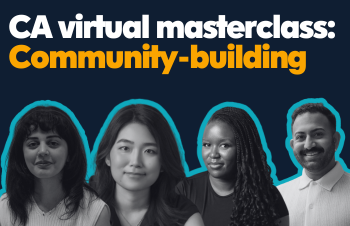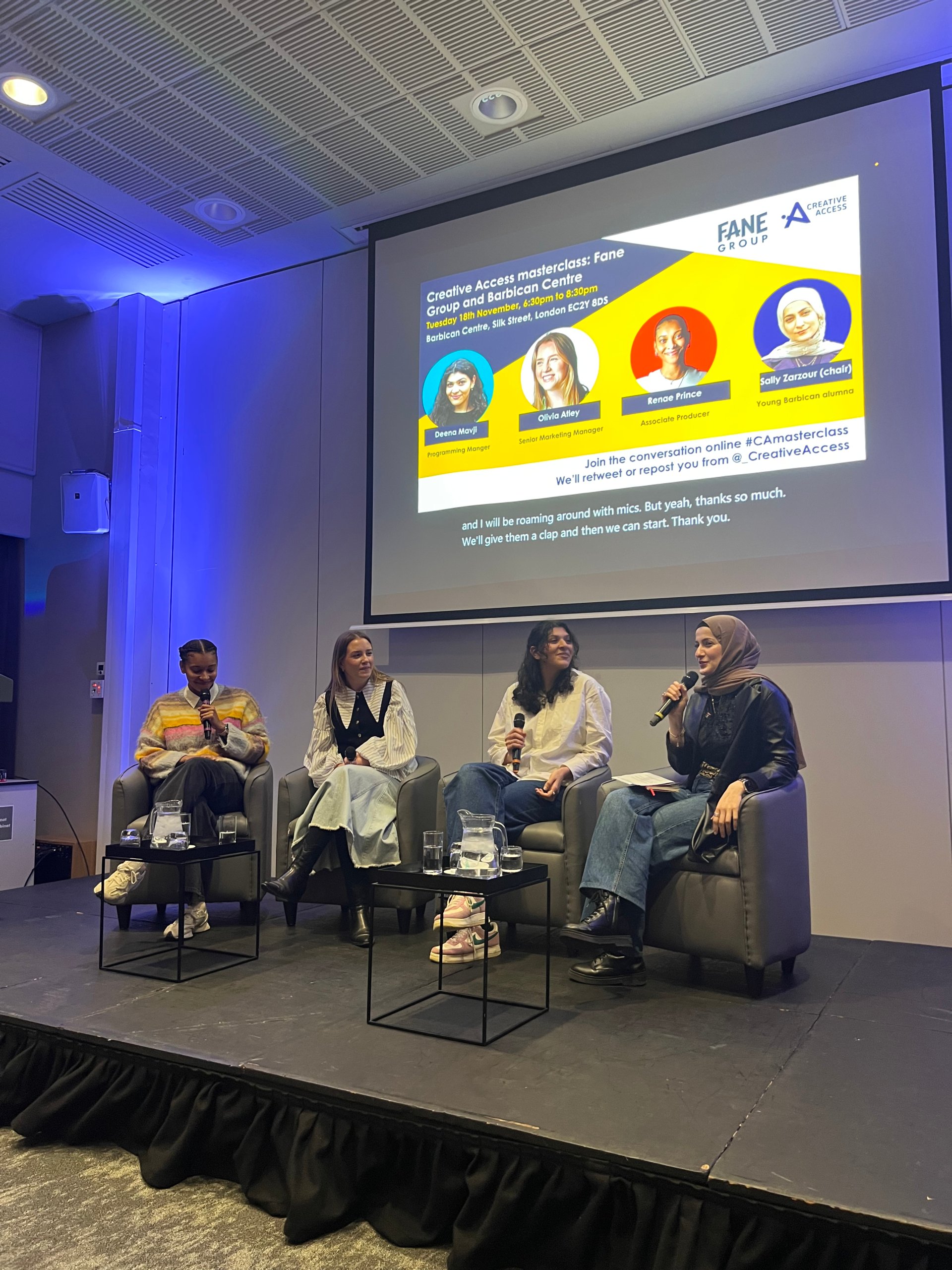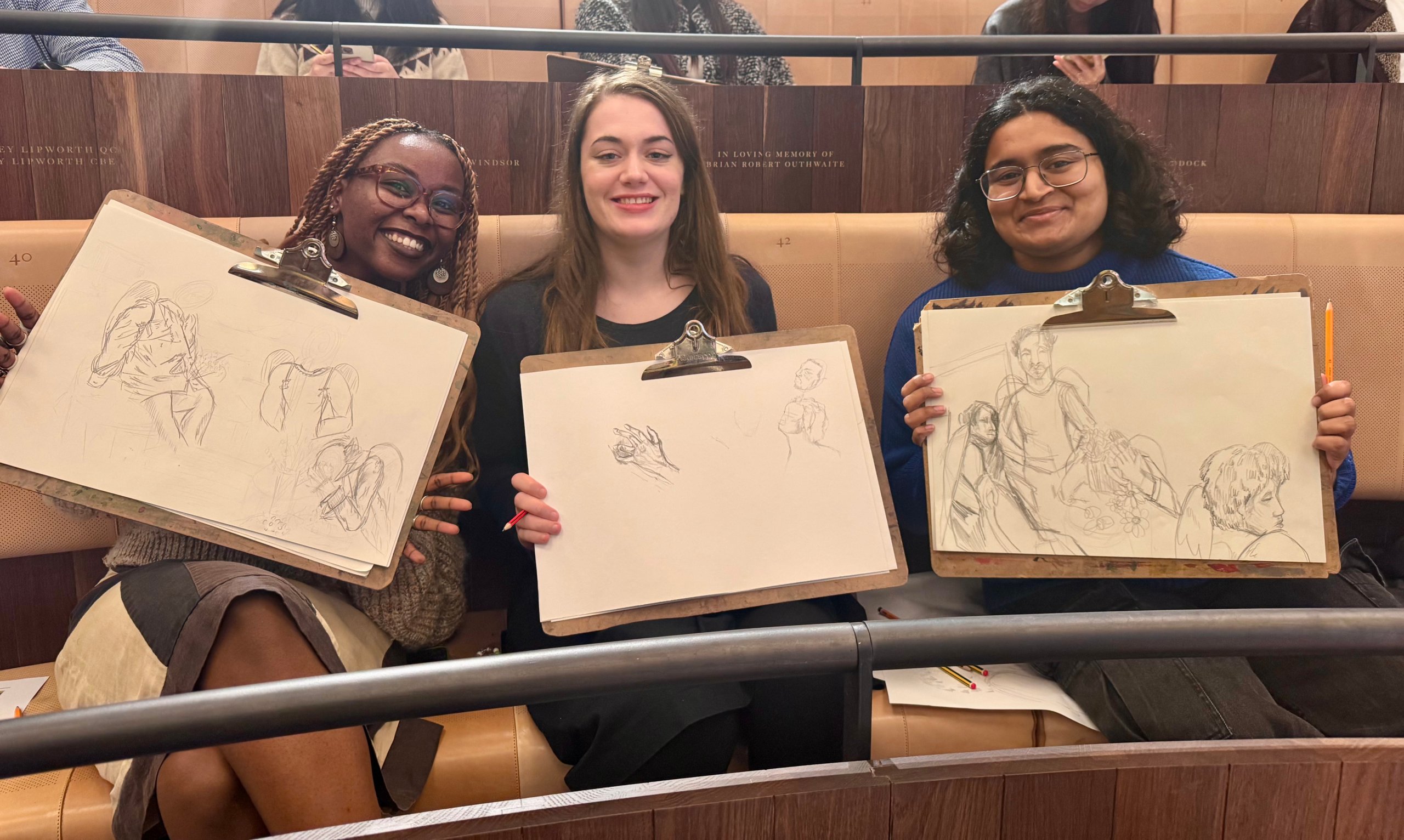It was brilliant for the Creative Access team to be back in one of our favourite UK cities Leeds for our northern careers showcase at ITV Yorkshire, with a fantastic panel of speakers including Rawan Elsa, archivist and publishing assistant at Peepal Tree Press, Rhianne Deans, editorial/clearance co-ordinator at Emmerdale, Shamima Noor, communications co-ordinator at Fuel Theatre, Sonny Hanley, controller of content services at ITV and Ayodele Ogunshakin, story liner at Coronation Street, hosted by Ian Cottrell, director of channel operations at ITV.
Ian introduced sharing how he started out at ITV in 1999 with a degree in IT and was the first person in his family to go to university but didn’t know what to do next. Fast forward to 22 years later and he is now in a senior position at ITV Yorkshire.
Meanwhile, Sonny knew what he wanted to do from the age of 9 – he wanted to grow up and make films. Luckily, he grew up in Leeds and felt that pursuing a career with ITV Yorkshire was a perfect fit for him. He shared how he started out making programmes and then switched into technology before moving into operations. He’s had three careers at ITV and has been at the organisation almost as long as Ian, for 18 years!
Rhianne works on Emmerdale, one of ITV’s flagship shows filmed at ITV Leeds. The show has been going for over 50 years and we were even lucky enough to have a tour of the studio after the event. Rhianne’s role includes writing synopses of the scenes for press or for actors, collaborating with script editors and making script changes to ensure the scripts fit within allotted time. She got into the industry through an internship at Arrow Media through Creative Access, and before joining Emmerdale, she worked on Channel 4’s All Creatures Great and Small.

Leeds local, Shamima works within theatre communications. She has been working in theatre for 5 years after starting her career with a traineeship through Creative Access in 2017 at Leeds Playhouse, after which she then worked for a few dance and theatre companies. Shamima grew up in Leeds, studied there and stayed on in the area to develop her career, proving that you can live outside London and develop a rich career in the creative industries. She works for a London based company and goes down to London about twice a month.
Rawan is currently undertaking a PhD, alongside her work as an archivist and publishing assistant. She has a fascinating role and has spent the last few years archiving letters, documents and manuscripts for Peepal, an independent publishing specialising in African literature. She describes herself as wearing many hats, as she also runs an online book club making literature accessible to people beyond the UK.
Ayodele worked at a summer camp in the US after university. She initially thought it was a bad decision, but the experience of working with children proved critical in her getting a role at Blue Peter. From there she moved up to studio assistant and after going to a Creative Access workshop on how to become a storyliner, she got her first break as an assistant storyliner on Coronation Street. She describes being a storyliner as an “odd position”. She works in a team of other storyliners, answering to the producer.
“What have you done that’s outside the box? Utilise that!” – Rawan
Our panel all cited the importance of transferable skills and experiences when trying to break into the creative industries. Shamima explained that in her first internship at Leeds Playhouse, they were mostly looking for passion for theatre and good personal skills. She’d worked on her student paper, been a student outreach officer, written a lot outside her degree, and handled the social media channels for societies she was a part of at university. She was able to marshal these skills into a CV and cover letter, which then got her the role.

Rawan echoed this explaining: “experience is invaluable”. Even though her degrees are important and she’s enjoyed her academic journey, it was the internships and volunteering at places like Elizabeth Gaskell’s House that displayed her passion for history. Alongside this, she states that she identified people she admired and spoke to them on twitter, went to careers fairs and networking evets – all of which helped her land her roles.
When it comes to specific roles, such as storylining, Ayo recommended watching lots of TV as ‘research’. She took on a runner role to expose her to the innerworkings of the TV industry, but she says: “Don’t discount the non-TV experience you have”. Lots of TV work is about teamwork and that can come from university, volunteering and roles outside the sector.
“When people are open to a chat, they might be open to helping you find work, so take those chats seriously” – Ayo
Networking is a key skill for finding work, mentors and even likeminded peers within the creative industry. Rhianne empathised that networking can be awkward, admitting that she used to be really bad at it, but she told our audience that they’d be surprised by how many people want to share their knowledge. People are busy so you shouldn’t feel worried about following up and reminding them. She also advised the audience to not confuse being formal with being professional – you can be jokey and show your personality which can then engage people and make you stand out.
Shamima agreed explaining that these events are nerve-wracking, but you find your own rhythm. “Ffrom the start it was clear to me taking part in events was going to be key. After-parties after each event you should go to show you’re committed.” Similarly, Ayo recommended thinking of networking as ‘connecting’ with people instead, which takes the pressure off the interaction.
“You’re not just there because of luck. You’re there because you’ve excelled. If you trip up, pick yourself back up again” – Rawan
On this note, our panel then began to discuss how imposter syndrome can manifest itself and how they overcome it. Rawan had some wonderful advice for our audience, she explained that she looks in the mirror and recites positive affirmations about herself to reassure herself. She suggested writing them down and even sticking them around your room when you’re feeling low.
Rhianne and Sonny both work at ITV and have both found their networks within the organisation a great source of comfort when they have been feeling insecure in their positions or have had a bad day at work. Sonny told our audience to remember: “They chose you! If you don’t believe that, just go ask your manager.”
Ayo actually did do this once during a period of low self-confidence at work. Her line manager told her that she was doing well, despite thinking otherwise. She told the audience to remember that that’s what your line manager is there for.

“The perfect candidate doesn’t exist” – Sonny
As for moving up in your creative career, Sonny said it is vital to step outside your comfort zone. “No one knows their job 100%, I’ve been here for 18 years and I still don’t know anything”, he said. He continued that therefore, when he’s hiring, he always hires 80% – he knows that no one is going to have every single skill needed but if the confidence and passion is there that will see you through.
Rhianne agreed and explained that of course knowledge and skills are important, but the most important thing is how you fit into a team. If you work within an organisation that has many teams and you want to take a sideways step, Rhianne recommended utilising the network you have within the company and getting to know the roles and the team dynamics to help you.
“There’s no set time frame! If you want to do it, it’ll happen” – Rhianne
Finally, our audience asked our panel about the age-old problem of rejection. Rhianne stated that unfortunately, rejection is part of the industry and you do have to grow a thick skin however, she continued, there are lots of people who want to help you so make sure you keep making those connections. While Rawan suggested that “rejection can help you take a step back and reassess what you really want.”
Thank you so much to our wonderful panel for their insights into their respective fields and highlighting the breadth of roles on offer in the creative industries in the North, as well as to our audience for coming along and asking such important questions!




